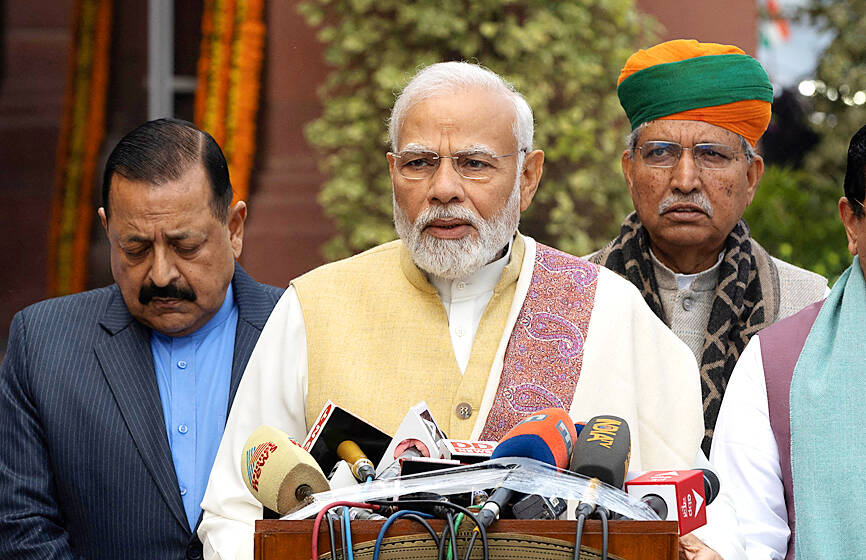It took less than two weeks for TotalEnergies SE to put a massive hydrogen energy project with Adani Group on hold after the Indian conglomerate was rocked by allegations of fraud.
The deal — part of a plan in which billionaire Gautam Adani’s energy business would have invested US$50 billion over the next decade in the fuel — remains in limbo, a victim of Hindenburg Research’s short-seller report.
The fallout is unlikely to be limited to the Adani empire. The controversy over the business practices of the group — which became one of the country’s biggest investors in renewable energy sources after expanding from transport infrastructure — means there will likely be greater scrutiny of Indian corporate governance across the board.

Photo: Reuters
Energy transition investments in India already lag behind other major nations and now the cost of capital is increasing as global interest rates rise, while the US Inflation Reduction Act is creating more opportunities for clean-power investors in the US and its free-trade partners.
That spells trouble for Indian Prime Minister Narendra Modi’s goal to put India at the forefront of climate action.
“The markets are enforcing discipline on companies, including Adani, to reduce debt and bring in equity,” said Shashank Krishna, a London-based partner at law firm Baker Botts LLP, who advises clients on energy and infrastructure deals. “Some projects that are borderline economically viable or may not have a strong business case will have to be shelved or reduced in size.”
The headwinds are making the Indian government’s goal of tripling clean-electricity capacity by the end of the decade less achievable.
New Delhi wants to increase the current 169 gigawatts to 500 gigawatts by 2030, taking its percentage of the total from 41 percent to almost two-thirds.
If it falls short of the target, the world’s third-largest emitter would rely on coal for longer. That is bad news for the Indian economy, which hopes to lure investment from multinationals under pressure to decarbonize their supply chains.
While India installed 15 gigawatts of grid-connected wind and solar capacity last year, 44 percent more than in 2021, it is still well short of what is needed to reach the 2030 target.
Moreover, making a major increase in the level of investment was already proving tough before the Adani crisis.
Investment in the deployment of renewable energy technology rose about 4 percent to US$11.5 billion in India last year, but that was still lower than a recent peak of US$12.7 billion in 2017, data compiled by BloombergNEF showed.
Fiscal incentives such as US legislation are drawing a lot of capital that could have potentially found its way to India, said Anita George, a cofounder of Edhina Capital, an Indian private-equity firm looking to invest in clean energy, mobility, green buildings and recycling opportunities. “That has been a dampener for all the emerging markets, not just India.”

A new online voting system aimed at boosting turnout among the Philippines’ millions of overseas workers ahead of Monday’s mid-term elections has been marked by confusion and fears of disenfranchisement. Thousands of overseas Filipino workers have already cast their ballots in the race dominated by a bitter feud between President Ferdinand Marcos Jr and his impeached vice president, Sara Duterte. While official turnout figures are not yet publicly available, data from the Philippine Commission on Elections (COMELEC) showed that at least 134,000 of the 1.22 million registered overseas voters have signed up for the new online system, which opened on April 13. However,

ALLIES: Calling Putin his ‘old friend,’ Xi said Beijing stood alongside Russia ‘in the face of the international counter-current of unilateralism and hegemonic bullying’ Chinese President Xi Jinping (習近平) yesterday was in Moscow for a state visit ahead of the Kremlin’s grand Victory Day celebrations, as Ukraine accused Russia’s army of launching air strikes just hours into a supposed truce. More than 20 foreign leaders were in Russia to attend a vast military parade today marking 80 years since the defeat of Nazi Germany in World War II, taking place three years into Russia’s offensive in Ukraine. Putin ordered troops into Ukraine in February 2022 and has marshaled the memory of Soviet victory against Nazi Germany to justify his campaign and rally society behind the offensive,

ENTERTAINMENT: Rio officials have a history of organizing massive concerts on Copacabana Beach, with Madonna’s show drawing about 1.6 million fans last year Lady Gaga on Saturday night gave a free concert in front of 2 million fans who poured onto Copacabana Beach in Rio de Janeiro for the biggest show of her career. “Tonight, we’re making history... Thank you for making history with me,” Lady Gaga told a screaming crowd. The Mother Monster, as she is known, started the show at about 10:10pm local time with her 2011 song Bloody Mary. Cries of joy rose from the tightly packed fans who sang and danced shoulder-to-shoulder on the vast stretch of sand. Concert organizers said 2.1 million people attended the show. Lady Gaga

CONFLICTING REPORTS: Beijing said it was ‘not familiar with the matter’ when asked if Chinese jets were used in the conflict, after Pakistan’s foreign minister said they were The Pakistan Army yesterday said it shot down 25 Indian drones, a day after the worst violence between the nuclear-armed rivals in two decades. Pakistani Prime Minister Shehbaz Sharif vowed to retaliate after India launched deadly missile strikes on Wednesday morning, escalating days of gunfire along their border. At least 45 deaths were reported from both sides following Wednesday’s violence, including children. Pakistan’s military said in a statement yesterday that it had “so far shot down 25 Israeli-made Harop drones” at multiple location across the country. “Last night, India showed another act of aggression by sending drones to multiple locations,” Pakistan military spokesman Ahmed